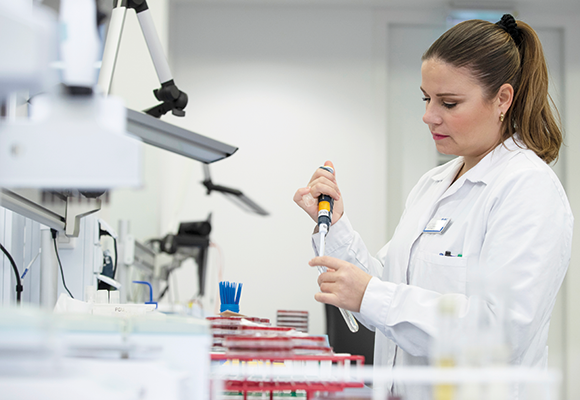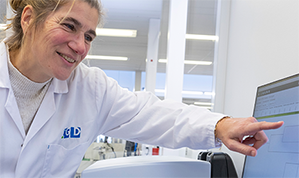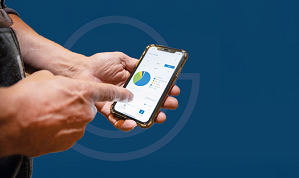Research and Development

Royal GD has a Research and Development department with highly specialised scientists and technicians in multiple laboratory disciplines and epidemiology. We support the operational and commercial activities of GD and GD Group. The majority of our scientists have a PhD degree and some of them are internationally recognized experts in their field of expertise. Our laboratory diagnosticians
The R&D department is involved in:
- Quality assurance (including test validation and troubleshooting) of diagnostic tests in GD's operational laboratory (ISO17025 certification).
- Development of new products and programmes for GD's clients, e.g. by developing new laboratory assays.
- Providing expertise in contract research projects with our partners in the animal health industry worldwide.
- Providing statistical support for research, quality assurance of our products, monitoring and surveillance.
- Service laboratory tests that are custom made according to specific requests in contract research projects.
All studies are conducted in accordance with international standards and requirements (e.g. EP monographs, OIE and VICH guidelines), national and international regulations and support the development, registration or marketing of veterinary products. We work in a BSL-2 laboratory and are able to carry out GMO work in part of our facilities. Optionally, studies can be conducted to GMP, GLP and GCP standards.

Laboratory disciplines
For test development and validation, we have a well-equipped laboratory and access to a collection of well-defined samples and field samples, a large collection of viral (mainly poultry) and bacterial isolates with over 8,000 and 22,000 isolates respectively. Current laboratory disciplines we are active in:
- Molecular Biology: Development of qPCRs (including primer and probe design), standardization of NA isolation and PCR protocols, sequencing (nanopore), bioinformatics (scripts for virus discovery), SARS-CoV2.
- Immunology: (in-house) ELISAs, multiplex-ELISAs, biosensoring, serum/(bulk)milk ELISA-robots, Salmonella (cattle, swine, poultry), Treponema (cattle), SBV, BVDV, etc.
- Virology: Virus culture, virus purification (ultracentrifugation), plaque assays, PTS, VNT, Influenza.
- Histology: IHC, ISH.
- Bacteriology: MIC, Maltitof biotyping, Malditof IR subtyping, classical bacteriology, Mycoplasma, PTS.
- Parasitology: Eimeria, in vitro assays.
- (Clinical) chemistry: Enzymatic, colorimetric or turbidimetric methods, trace element analysis (ICP-MS), hormones, signal molecules (CL/AlphaLISA), water quality (chromatography and ICP-MS).
Epidemiology
Our scientists in the epidemiology department specialize in quantitative epidemiology, statistics and data science and have a background in biology, veterinary science, animal science or medicine, with a focus on epidemiology. The majority of the epidemiologists in the R&D team have a PhD degree and have extensive experience in veterinary epidemiology and monitoring and surveillance. Multiple team members are also internationally recognized experts in the field. Our epidemiologists
Current topics
- Monitoring and surveillance: Syndrome surveillance, early warning systems, evaluation of monitoring components, trend analyses, risk analysis, scenario tree models for absence of disease.
- Statistics: Test validation, quality assurance of lab tests, pooling of samples, sample size calculation, selection of study and target populations, selection of analytical technique.
- Information Products: Analysis of individual herd or animal data, development and validation of information tool, development of digital dashboards.
- Scientific input: Ensuring a scientifically sound approach in clinical trials, contract research and innovation projects.
Our research projects
Apart from supporting GD’s commercial activities, our R&D team is continuously working on a wide range of innovation projects. Here are a few examples of what we are working on. Interested in collaborating with GD on innovation?

Fourier transform infrared (FTIR) spectroscopy is a technique which enables the mutual comparison and clustering of infrared spectra of various bacteria. The results can be used when formulating a specific farm approach for the detected strains of bacteria.
More information

Monitoring animal behaviour
What behaviours do your chickens display? Do they take care of themselves enough, do they eat and drink as usual and do they get enough exercise? With a camera system and the FlockVision app you can always see how the animals in your stables are doing.
More information